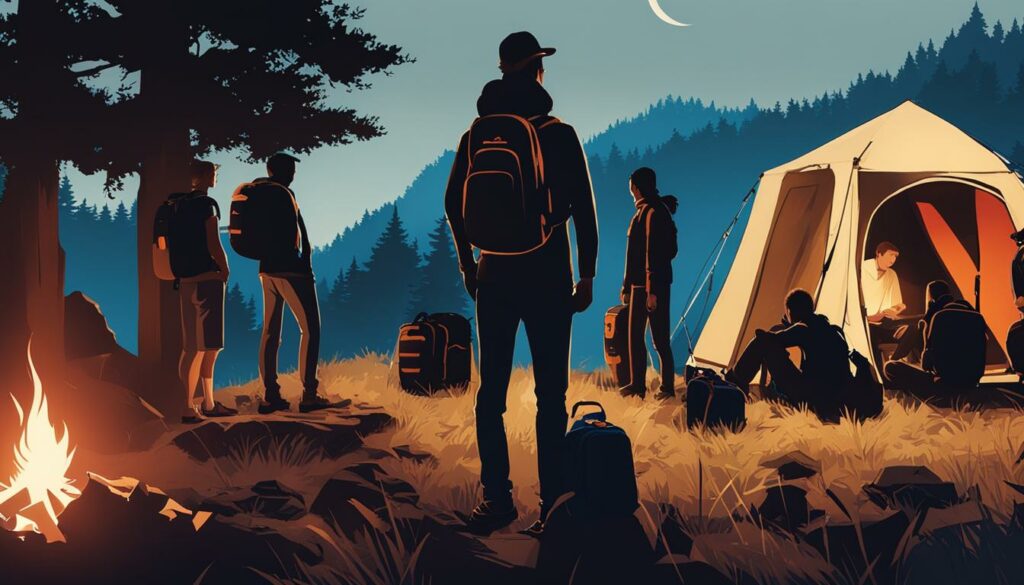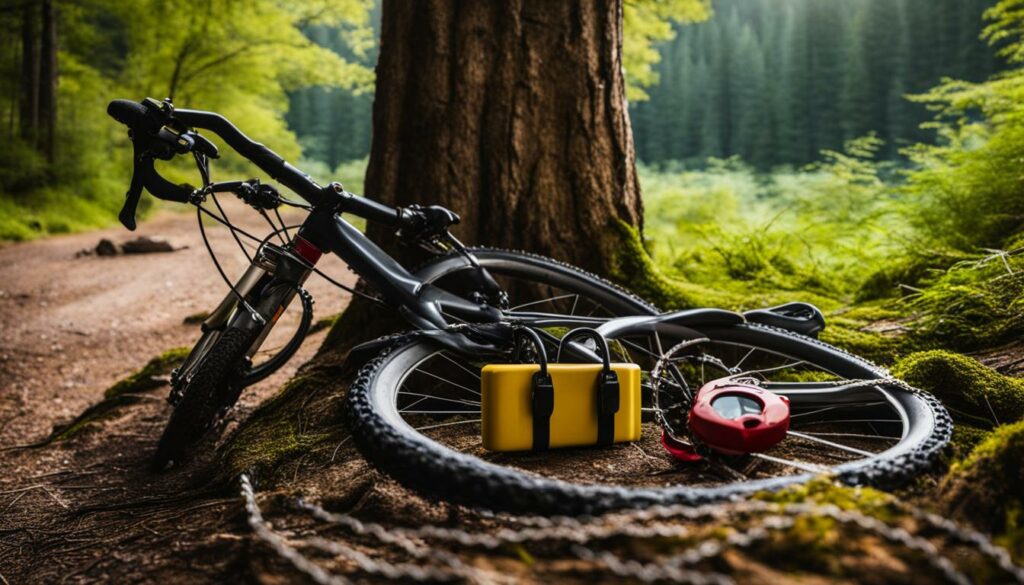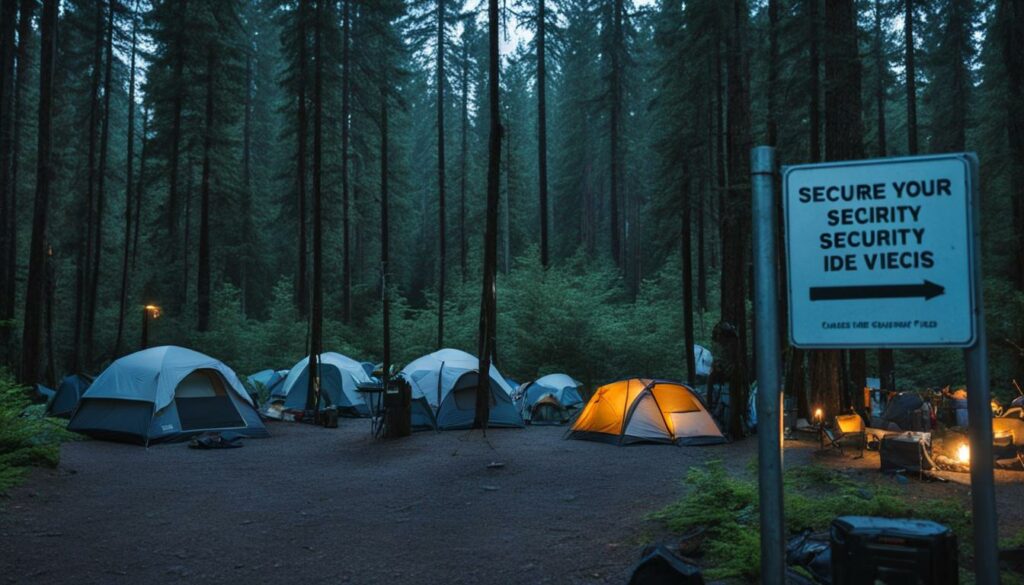Camping is a favorite pastime for many people, offering an escape from the hustle and bustle of everyday life. However, while camping offers a chance to connect with nature, it also comes with the potential risk of theft. Theft at campsites can occur when campers leave their belongings unattended or fail to take necessary security measures. This can leave campers vulnerable, and it is vital to be aware of the risks and take precautions to prevent theft.
Key Takeaways:
- Camping is a fun and enjoyable experience that requires awareness of security and theft prevention.
- Proper planning and research in choosing a secure campground can greatly reduce the risk of theft.
- Securing valuables, using locks and security devices, and building a campground community for security can help prevent theft.
- Personal safety measures such as self-defense techniques and awareness can be used to minimize the risk of theft.
- Cybersecurity is also important in campgrounds, and campers should take necessary precautions to protect their devices and personal information.
Understanding the Risks of Theft in Campgrounds

When embarking on a camping trip, it is crucial to understand the risks of theft in campgrounds to ensure a safe and secure experience. Whether you are a seasoned camper or a first-time adventurer, safeguarding your belongings should be a top priority. Failure to take the necessary precautions can result in theft, leading to a ruined vacation and financial loss.
Common targets for thieves in campgrounds include electronics (such as smartphones and laptops), cash, jewelry, and camping equipment. While some campsites may provide lockers or safes to store valuables, most do not, leaving campers vulnerable to theft.
It is essential to be aware of the vulnerabilities at your campsite and take proactive measures to prevent theft. Some secure camping practices and campsite theft prevention measures include:
1. Keeping Valuables Out of Sight
Thieves are often attracted to items left in plain sight, so it is essential to keep valuables out of view. Stow away electronics and other valuable items in a secure location, such as a locked vehicle or hidden compartment.
2. Investing in a Portable Safe
A portable safe can be an excellent investment for campers looking to safeguard their belongings. These small safes can be locked and attached to a fixed object, providing an additional layer of protection for valuable items.
3. Camping With Others
Camping with others can help increase security and deter potential thieves. In addition, staying in established campgrounds with designated campsites can provide an added level of security due to the presence of other campers and staff.
By understanding the risks and implementing secure camping practices, you can reduce your chances of falling victim to theft while enjoying a worry-free camping experience.
Choosing a Secure Campground

Choosing the right campground is key to ensuring a safe and secure camping experience. Keep these campground security tips in mind when making your selection:
- Check if the campground has security personnel on site.
- Research the campground’s reputation for security.
- Look for amenities that promote safety, such as well-lit areas and security cameras.
- Beware of campsites located near roadways or public access points, as they may be more susceptible to theft.
Additionally, camping security strategies can vary depending on the location and terrain of the campground. For instance, wooded areas may require additional precautions against wildlife and theft. Always research the location and terrain beforehand to better prepare for any potential risks.
Remember that theft prevention tips for campers begin with choosing the right campground. Prioritize security when making your selection to ensure a safe and enjoyable camping experience.
Setting Up a Secure Campsite

Securing valuables while camping is crucial to protecting them from potential theft. To set up a secure campsite, it is important to take several essential steps.
Choosing the Optimal Location
The first step in setting up a secure campsite is selecting the right location. It is recommended to camp in designated areas that are well-lit and have proper security measures in place.
When choosing a spot within the camping area, avoid areas that are isolated, near heavy foot traffic, or have poor visibility. Consider setting up camp near other campers to create a sense of community and deter potential thieves.
Proper Storage of Valuables
Proper storage of valuables is another crucial step in securing a campsite from theft. When leaving the campsite, ensure all valuable items are stored safely and out of sight.
One option is to store valuables in a locked vehicle or trailer. If this is not possible, invest in a portable safe or lockbox to store valuables securely within the campsite.
It is also important to never leave valuable items unattended, as this may make them an easy target for theft.
Be Aware of Surroundings
Being aware of surroundings is also a key factor when setting up a secure campsite. Always be mindful of any suspicious behavior or individuals and report any concerns to campground security personnel or authorities.
When venturing away from the campsite, consider taking only essential items and leaving valuables locked away or with a trusted individual.
By taking these steps and ensuring proper site setup, campers can significantly reduce the risk of theft and enjoy a safe and worry-free camping experience.
Utilizing Locks and Security Devices

Campers can enhance their theft prevention efforts by utilizing locks and security devices to keep their belongings safe. There are various types of locks and devices campers can employ, depending on the specific needs and circumstances of their campsite.
One of the most common security devices used by campers is a cable lock, which allows users to secure their valuables to a stationary object, such as a picnic table or tree. Cable locks are versatile and provide a high level of security against theft.
Another popular option is a portable safe, which is a lightweight and portable container that can be locked to store important documents, electronics, and other valuables. Many models come with a cable that can be anchored to a fixed object.
Camper van owners or those with a larger camping setup may benefit from installing a locking storage box or truck bed storage system. These can be bolted down and make it more difficult for thieves to steal large or unwieldy items, such as generators or bikes.
It’s important to note that while locks and security devices can provide additional protection against theft, they are not foolproof. Campers should still practice other theft prevention tips and strategies, such as choosing a secure campground, utilizing a community watch system, and keeping a close eye on their belongings.
“Campers can enhance their theft prevention efforts by utilizing locks and security devices to keep their belongings safe.”
Considerations when Selecting a Lock or Security Device
When selecting a lock or security device for your campsite, there are several factors to consider. First and foremost, it’s essential to choose a device that is suitable for the items you want to protect. A locking storage box may be the right choice for larger, high-value items, while a cable lock may suffice for smaller personal items.
Another consideration is the level of security you need. Some cable locks are more secure than others, and portable safes may be easier to break into than larger storage containers.
Finally, campers should consider the portability and ease of use of the lock or device they choose. A heavy and bulky storage box may not be feasible for those who plan on moving frequently, while a lightweight cable lock may be more convenient for backpackers or hikers.
Building a Campground Community for Security
Campers can take a proactive approach to preventing theft by building a campground community dedicated to security. This involves clear communication, cooperation, and a commitment to report suspicious activities to campground management or authorities.
Here are some campground security tips for campers to build a secure community:
| Campground Security Tips | Camping Security Strategies | Theft Prevention Tips for Campers |
|---|---|---|
| Introduce yourself to nearby campers and exchange contact information. | Establish an emergency plan with your camping neighbors to ensure that everyone knows how to respond quickly in case of an incident. | Store your valuables in a secure location or bring them with you when leaving the campsite. |
| Join camping groups or clubs to connect with fellow campers who share your security concerns. | Be respectful of quiet hours and respect the privacy of other campers. | Take advantage of available campground security services such as nighttime patrols or surveillance cameras. |
| Stay vigilant and report any suspicious activity to campground management or authorities immediately. | Work together to keep the campground clean and orderly, reducing the risk of unwanted visitors. | Participate in educational programs or workshops offered by the campground to learn more about security measures. |
By working together and following these camping security strategies, campers can create a robust community committed to preventing theft and safeguarding personal belongings.
Personal Safety Measures for Campers
While setting up a secure campsite is important, it is also essential to take personal safety measures to minimize the risk of theft while camping. Here are some campground security tips, camping security strategies, and theft prevention tips for campers to keep in mind:
- Be aware of your surroundings and keep an eye out for suspicious individuals.
- Lock your vehicle and keep valuables out of sight.
- Don’t advertise expensive gear – keep expensive equipment, electronic devices, and jewelry hidden as much as possible.
- Avoid camping alone and stick to well-lit areas at night.
- Carry a whistle, flashlight, and a charged cell phone with you at all times.
Moreover, it is a good idea to learn some basic self-defense techniques, such as pepper spray and other non-lethal weapons that can help you protect yourself better. Preferably, take a self-defense class geared to outdoor activities and bring a basic first aid kit for minor injuries or emergencies. Lastly, campsite theft prevention measures are not limited to the immediate confines of your tent. When venturing far away from your campsite, make sure to secure your valuables and store them away from prying eyes using a portable lockbox or other similar means.
Securing Valuables While Exploring
Even when campers leave the campsite, their valuables still face a risk of theft if left unattended. To prevent this, it’s crucial to take measures to secure belongings while exploring, hiking, or visiting nearby attractions. Below are some effective strategies for securing valuables while camping:
- Lock it up: Bring a lock with you and use it to secure your valuable items in your vehicle or a locker if provided at the location.
- Divide and conquer: Split up valuable items and hide them in different locations, so if one item is taken, you won’t lose everything.
- Stay watchful: When hiking or exploring, keep a watchful eye on your surroundings. Avoid leaving items unattended, even for a few minutes.
- Keep it close: Whenever possible, keep valuables close to your body. This could mean carrying a small backpack or utilizing a fanny pack to minimize the risk of theft.
- Document it: Take photographs of your belongings before your trip and keep a written record of their descriptions, serial numbers, and other identifying information. In the event of theft, these records will help you accurately report stolen items.
By following these simple strategies, campers can better secure their valuables while exploring and enjoy a worry-free trip. However, it’s always crucial to stay alert and keep personal safety in mind while exploring.
Cybersecurity in Campgrounds
While theft prevention tips for campers often focus on physical security, it’s essential not to overlook the importance of cybersecurity. Campers need to be aware of the potential risks associated with online activities while camping and take steps to protect their devices and personal information.
The Risks of Online Threats
Campers who use public Wi-Fi networks or unsecured connections put themselves at risk of cyber-attacks. Hackers can use these networks to gain access to personal information, including passwords, financial details, and sensitive data. Additionally, malicious software can be downloaded unknowingly by campers, causing significant problems both during and after the camping trip.
Cybersecurity Strategies for Campers
To protect against cyber threats, campers should employ several key strategies:
- Use a virtual private network (VPN): This is an effective way to secure online connections by creating a private connection from a public network. By using a VPN, campers can encrypt data sent over the network and protect their privacy and sensitive information.
- Be cautious when using public Wi-Fi: Campers should avoid accessing sensitive information or online banking while using a public Wi-Fi network. Instead, it’s best to wait until they are on a secure network or use a personal hotspot.
- Keep devices secure: Campers should ensure their devices are up to date with the latest software and security patches. Additionally, they should use strong and unique passwords for all accounts and consider using two-factor authentication.
- Protect personal information: Campers should avoid sharing personal information online, including sensitive data like bank account numbers, social security numbers, or home addresses. When purchasing items online, they should ensure the website is secure and has a trusted payment system.
Responding to Theft Incidents
In the unfortunate event of a theft incident, it’s crucial to respond effectively to maximize the chances of recovering your stolen items. The following are essential steps to take:
- Stay calm: The first step is to remain calm and focused, as a clear mind enables effective decision-making.
- Report the theft: Notify the campground management or authorities immediately to initiate an investigation and increase the likelihood of recovering stolen items. Be prepared to provide detailed information, such as a description of the stolen items and their estimated value.
- Secure your campsite: After reporting the incident, secure your campsite to prevent further theft. Lock your vehicle and remaining valuables securely, and consider relocating to a different campsite if necessary.
- Document the incident: Record all details related to the theft incident, including the time of occurrence, stolen items, and any eyewitness accounts. This information will be useful when filing an insurance claim or assisting authorities in identifying suspects.
By following these steps, you can respond effectively to a theft incident and increase the likelihood of recovering your stolen items.
Conclusion
As discussed throughout this comprehensive guide, theft prevention in campgrounds is crucial to ensuring a safe and enjoyable camping experience. By implementing secure camping practices and campsite theft prevention measures, campers can reduce the risk of theft and protect their belongings.
Choosing a secure campground, setting up a secure campsite, utilizing locks and security devices, building a campground community for security, taking personal safety measures, securing valuables while exploring, and practicing cybersecurity are all essential strategies for preventing theft in campgrounds.
By following these tips and techniques, campers can enjoy a worry-free camping experience and focus on the joys of the great outdoors. Remember to always remain vigilant and report any suspicious activities to campground management or authorities.
If a theft incident does occur, it is important to respond promptly and follow the proper steps to ensure a thorough report for potential recovery. With the implementation of these theft prevention strategies, campers can rest assured that their camping trips will be secure and enjoyable.
FAQ
What are some common targets for thieves at campgrounds?
Common targets for thieves at campgrounds include unattended campsites, unlocked vehicles, and easily accessible personal belongings.
How can campers reduce the risk of theft at their campsites?
Campers can reduce the risk of theft by securing their valuables, using locks and security devices, choosing a secure campground, and building a campground community for security.
What should campers consider when selecting a secure campground?
Campers should consider the campground’s reputation for security, the presence of security personnel, and the availability of amenities that enhance safety and security.
What are some tips for setting up a secure campsite?
Tips for setting up a secure campsite include choosing a secluded location, storing valuables securely, keeping personal belongings out of sight, and avoiding displaying expensive equipment.
How can locks and security devices enhance theft prevention at campgrounds?
Locks and security devices can deter thieves and provide an added layer of security for campers’ belongings. Examples include using padlocks to secure tents, cable locks for bikes, and hitch locks for trailers.
How can campers collaborate to establish a safe campground community?
Campers can establish a safe campground community by maintaining open communication, forming neighborhood watch groups, sharing information about suspicious activities, and reporting any incidents to campground management or authorities.
What personal safety measures should campers take to minimize the risk of theft?
Campers should practice personal awareness, keep valuable items secure and out of sight, lock their vehicles and tents when not in use, and learn basic self-defense techniques.
How can campers secure their valuables while exploring outside the campsite?
Campers can secure their valuables while exploring by using lockable storage containers, carrying minimal cash and valuables, and using concealment devices such as diversion safes.
What are some cybersecurity tips for campers?
Campers should secure their devices with passwords or biometric authentication, avoid using public Wi-Fi for sensitive transactions, and be cautious when sharing personal information online while camping.
What should campers do if they experience a theft incident?
In the event of a theft incident, campers should immediately report the incident to campground management or authorities, provide a detailed description of the stolen items, and cooperate fully with any investigations or recovery efforts.





